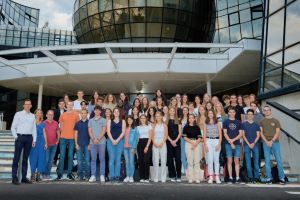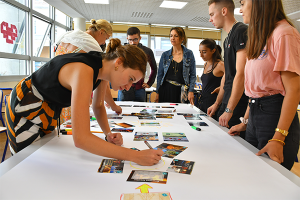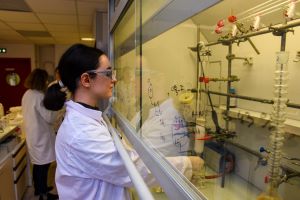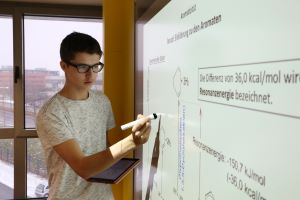Values and policies
Today, it is not possible to innovate in various domains, without calling on the knowledge and expertise of chemists and chemical engineers. Consequently, it is necessary to produce high-level scientists and engineers with a broad intercultural knowledge and experience, as well as significant managerial and soft skills. These young people would then be able to explore and help in finding ecofriendly solutions in order for societies to act eco-responsibly. The Federation Gay-Lussac’s actions are centered on 4 values.

Transmission & cooperation
The objective of the Federation Gay-Lussac is that all their chemistry and process engineering graduate schools work together in order to provide the skills and knowledge necessary for these future scientists and engineers. For this, they discuss and share their experience in work groups that help foster mutual respect. They pool their resources to make the education offered accessible to all and provide innovative teaching.
- Each year, 500 students enter integrated preparatory classes, which are a privileged points of entry to join the Federation Gay-Lussac graduate schools.
- The Federation Gay-Lussac enables an inter-school mobility as a function of the specialties chosen by the student
- The schools have led to joint international actions and notably created two Franco-Chinese Institutes.
- Together, they have created a teaching content plateform designed to be used by all their teaching staff.

a school engaging in a
sustainable development approach
Responsibility
The Federation Gay-Lussac has positioned itself as a major actor in the present ecological and societal transition. Its mission is to educate the chemists and chemical engineers of the future, taking into consideration the diversity of society and engaging in lowering the carbon levels in the chemistry and process engineering sectors
- The Federation Gay-Lussac created a specific path Le Cycle Intégré Tremplin Ingénieur (CITI), for high school students who did a baccalaureate in Science and Laboratory Technologies (STL) could also enter the FGL graduate schools. The CITI is an integrated preparatory class that welcomes 30 students each year.
- In partnership with France Chimie, the Federatio Gay-Lussac organizes scientific events for a wide audience in an effort to make chemistry and process engineering accessible to all. For example, open to all pupils in their last two years of high school throughout France, there is the chemistry Olympiad competition (Olympiades de la chimie) and the Prix Pierre Potier .
- The Federation Gay-Lussac is firmly committed to lowering carbon levels via the consortium Décarbochim working alongside France Chimie and theADIUT (Assembly of IUT (University Institute of Technology) directors).

35% of classes is practical work
Expertise
The Federation Gay-Lussac graduate schools are the foundation of research and innovation in the industrial world as 40% of our graduates occupy posts in scientific and technical research & development. The Federation favors the dissemination of knowledge in the chemistry and process engineering domains and strongly encourages interdisciplinarity.
- With the French Academy of Science the Federation Gay-Lussac created the prize « la chimie au cœur des enjeux de la société (Chemistry at the heart of the challenges of today’s society ».
- the FGL is a partner and member of the organizing committee for the Société chimique de France (SCF). Every 3 years, it gathers the French chemical community as well as different international participants.

à l’ECPM Strasbourg
Innovation
All the Federation Gay-Lussac graduate schools encourage an entrepreneurial and innovative spirit. Through group projects, time spent studying or working abroad in internships or exchanges, campus life, the chemist or chemical engineer is encouraged to work with others and be creative in order to explore and find new solutions.
- With France Chimie, the Federation Gay-Lussac co-organizes the Young Innovation Prize which rewards the innovative projects of student engineers from the 20 chemistry and process engineering schools.
- Every year, the students organize an inter-chemistry-school tournament that brings together about 1000 students from the 20 graduate schools in the Federation for a weekend of sports competitions and festive activities.
- Students are also responsible for the organization of of the Chemistry Horizon Forum, a job fair that invites companies from the chemical industry.
